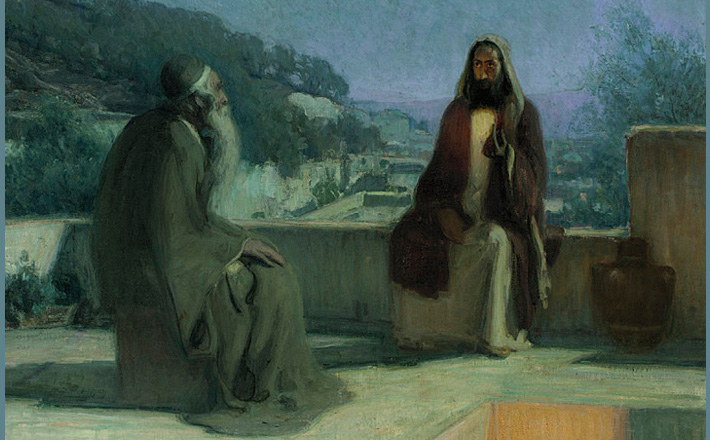Commentary on Romans 4:1-5, 13-17
When we step into Romans 4 we have to remember that we are coming to the final stages of an argument that has been unfolding since at least the middle of Romans 1.
Paul has been articulating reasons for his strong conviction that Jews and Gentiles stand on equal ground before God.
In Romans, Paul is not contrasting faith in general with works in general. This is not an argument about believing versus doing. On the contrary, Paul can describe the entire goal of his ministry as bringing about the right kind of doing, the obedience of faith (Romans 1:5). Instead, he is contrasting entrusting ourselves to the specific, saving narrative of Jesus, with defining ourselves by the Law that God gave to Israel. The question that looms over Romans 4, then, is this: Do Gentiles have to become Jews, by adopting the Jewish Law, in order to be part of the people of God, the promised children of Abraham?
Father Abraham?
Translating Romans 4:1 is a bit tricky. The NRSV reads, “What then are we to say was gained by Abraham, our ancestor according to the flesh?” The Greek, however, does not say “gained.” The word is “found.” We might think of Romans 4 answering the question, “What did Abraham find?” However, there is another option.
Both Richard B. Hays and N. T. Wright have argued that a better translation would be, “What then shall we say? Is Abraham found our ancestor according to the flesh?” To this the implied answer would be, “No.” He is not forefather according to the flesh (physical descent marked by the physical sign of circumcision). Instead, he is forefather because of his trust in God’s promise. This way of looking at Abraham’s paternity opens up the possibility that Gentiles who entrust themselves to Israel’s God might look to Abraham as their ancestor just as much as Jews who are physically descended from him.
In this way, Romans 4:1-5 fits with the argument about Gentile inclusion in the people of God. The big point isn’t that Abraham didn’t do anything [full stop]. The big point is that Abraham did not have to perform the actions, such as circumcision, that demarcated Israel as God’s unique, covenant people prior to God recognizing him as righteous and faithful.
The Breadth of God’s Promise
There are two ways that Paul expands on the blessing of God that you might not expect simply from reading the original story of Abraham. God had promised descendants as numerous as the stars of the sky and all the land from the Euphrates to the Mediterranean Sea.
Paul has an even more dramatic vision.
First, Paul expands the inheritance. No longer are we to think of Abraham inheriting the land of Israel, even with vastly expanded borders. Instead, Abraham’s inheritance is the whole world or even cosmos (Greek: kosmos; Romans 4:13). The salvation that God has brought in Christ is not an act that segregates one people on a special piece of real estate. It is a world-wide, even cosmic renewal that embraces the entirety of the created order. The breadth of God’s promised gift corresponds to the breadth of God’s redemptive work: the whole world is on offer for Abraham’s descendants.
Second, Paul expands on the identity of the heirs to God’s promise. In fact, he dramatically transforms the identity of the people of God in a way that most first-century Jews (including those who confessed Jesus to be the Messiah) found scandalous. The Law had clearly mapped the ways of blessing and the ways of curse. Blessing, and inheriting God’s promise was to be found within a Law-keeping people.
But Paul redraws the map. Now, wrath and curse are affiliated with the law, which circumscribes the place of transgression (see also Romans 5:20-21). In other words, being demarcated as a Jew through faithful keeping of the Law is not what makes a person a member of God’s people and an heir to Abraham’s promise.
By locating salvation in faith, Paul blows up the identity of the people of God: not only Torah-keeping Jews but also faithful Gentiles can be part of this people. The promise rests on the grace that comes to faith. And faith is not contained by the works of the law. It is available to everyone.
So not only does the breadth of God’s renewal encompass the whole world, it also encompasses all peoples. The promise to Abraham that he would be a father of many nations is now transformed: those aren’t nations that come out of Abraham’s body; they are nations that flock to Abraham’s God.
The God We Trust
The identity of God is never far from Paul’s claims about the breadth of the Gospel. The God behind this story promised Christ beforehand in scripture (Romans 1:2). The God who sent Jesus is the God not only of the Jews but also of the Gentiles (Romans 3:29). And he is the God who can promise a cosmic inheritance and a multinational paternity to Abraham because he is the God who “gives life to the dead and calls into existence the things that do not exist” (Romans 4:17).
Resurrection might seem to come out of the blue here. But Paul is going to use life out of death to describe both the birth of Isaac and the Christ event. Isaac is born to Abraham as to one who “had already died” and to Sarah whose womb was “dead” (Romans 4:19, literal translation). Even as Abraham believed God about the birth of Isaac, so those who respond to the Gospel believe that God has raised Jesus from the dead (Romans 4:23).
In the end, what connects Abraham to his descendants is not simply a human disposition of faith. It is the common object of our faith in the God who gives life to the dead, the God who, through the resurrection of Jesus, is making all things new.


March 12, 2017